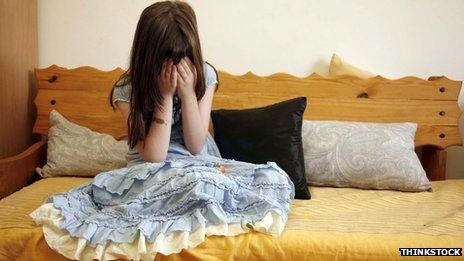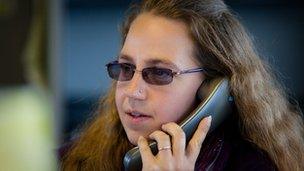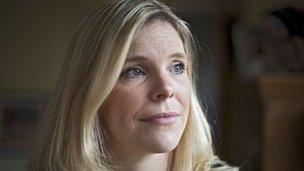After Baby P, what is life like for a social worker?
- Published

After scandals such as Baby P, many social workers feel criticised from all sides. The difficult nature of their job is revealed as the BBC is given unprecedented access to the Bristol child protection team.
It was newly qualified social worker Susanne's first case.
Three-year-old Toby could not speak and still had to use a nappy.
He lived with his mum and dad, Tiffany and Mike, in a cramped and dirty two-bedroom flat.
Toby did not have his own bed or a toothbrush. The carpet smelled of urine.

Susanne's training as a social worker included practical experience with families
It was classified as a "low risk" case, but Susanne found that what can seem straightforward could turn in directions you may not expect.
It ended with Toby, along with Tiffany and Mike's new baby, going into foster care - so how did it come to that?
Hated profession
A major turning point came when, four weeks in, bruises were found on Toby's arms. They were not consistent with the explanations Mike and Tiffany gave.
Mike was very hostile and defensive. "You're here to split the family up. Let's get it straight, you're here to wreck us," he shouted at Susanne on one home visit.
This hostility was not a surprise for Susanne. Her wider family won't even admit they have a social worker in their midst. "I think it's the most hated profession in the nation," she said.
But Mike's volatile behaviour did scare her.
"Any new job is always scary," she said, "but it's not nice to be shouted at. He can flip from second to second.
"I am worried about what will happen if I see him next and it gets into my dreams and into my subconscious where I don't want it to be," she admitted.
"If I'm that worried about Mike, if I'm that scared, how does Toby feel about this?"
Broken promises
"Dealing with hostility from families is immensely tricky," explained Sallyanne Jones, Susanne's team manager.
"People don't like the invasion that comes with having a social worker coming and asking questions about their personal life.
"It can get people's backs up, but that's what tests the social worker's professional skills, to get over that.
"Both Mike and Tiffany are suspicious of social workers. After Tiffany's tough childhood she says 'you don't want to put your child through the same thing that you went through.' But history often repeats itself."
After two months of unfulfilled promises, Susanne had seen little improvement in Toby's living accommodation and development.

Sallyanne Jones refused to remove Susanne from Toby's case, despite his father's demands
"Mum does nothing. She does lip service - saying, 'Yeah, I'll do that' - but he still doesn't have a bed, he doesn't have a toothbrush."
"Mike said: 'Oh, I don't brush my teeth - why should he brush his teeth?'," she explained to her manager. In the end the social workers bought Toby a bed themselves.
With cases such as Victoria Climbie and Baby P, the view of social workers can be that they are incompetent. Or on the other side they are criticised for being too keen to remove a child, a view that Mike subscribed to. He complained the social workers were always "changing the goalposts" to get their own way.
"When we hear about things in the media, we often hear the beginning and the end of the story and not the process in between," said Ms Jones.
"These decisions to remove or to place children for adoption are made after days, months, years of discussions trying to work out the right thing for a child." Dozens of different professionals can be involved.
She hoped the decision to allow cameras to follow their day-to-day work would show people how tricky making these decisions could be.
But only a court can decide whether to remove a child from its family.
"It's a huge process," said Ms Jones. "These kind of neglect cases are hard often to evidence. But they're not giving a standard of care that is good enough. It can't go on."
Susanne was supported by senior social workers and team manager Ms Jones when the decision was made to take legal action after a stark warning by a doctor.
They were told Toby had a developmental age of 12-24 months compared with his actual age of three years and eight months. A child like Toby "only has another six months before that window of opportunity to catch up with his peers will be lost".
Tiffany, meanwhile, had become pregnant again - her unborn child was now also a case for Susanne.
Mike's inability to parent properly was highlighted when Tiffany was taken to hospital with complications from her pregnancy.
Toby arrived at nursery with a wet nappy, shoes on the wrong feet and without having been fed.
At this point, an emergency protection order was applied for in court and Toby was taken into care.
Beginning to thrive
After three months in foster care, Toby showed signs of language development.
"His speech is coming on, he's been a lot happier, he's not been as aggressive, which has been nice," Tiffany admitted, on a visit to see him.
For Susanne this was a validation of why she went into social work. "To see him thrive is just so nice, it's such a beautiful thing to see him laugh.
"He was cross with the whole world around him, probably angry that they wouldn't meet his needs. (Now) he can communicate with you.
"That's why you go in to do social work, because you can make some changes."
Tiffany's new baby girl was also taken into care, but by then she and Mike had split up after a violent row.
Eight months after social workers first got involved, Tiffany made a major decision - to give her children up for adoption. "They'll be able to get the better care that they need," she explained in tears.
Susanne had admitted she would be "heartbroken" if she had to recommend that Tiffany should not get her children back, but she was hopeful that things would work out for Tiffany after making such a major decision.
"I'm very sure she will grasp this as an opportunity to sort out her past, to really get herself on track and to make healthy relationships."
Social workers are trained to keep an emotional distance from their cases, but for Susanne, things have not turned out that simple in reality.
"This case will probably stay with me all my life - I will always think about Toby and hope that he is doing OK."
"We try really hard not to get emotionally involved, because emotions can cloud judgements," explained Sally Anne, "but it's impossible not to.
"To not have an emotional reaction would make us not very human.
"I don't want to lose it, because it's probably quite healthy."
Protecting our Children is on BBC Two, Mondays from 30 January 21:00 GMT or watch online afterwards (UK only) at the above link.
- Published14 November 2011
- Published23 January 2012
- Published11 January 2011